Bursary Reports 2015
Laura Cowell
To Kidderminster Medical Society
First of all I would like to thank you for the grant that your society has given me, it has truly helped towards paying my tuition fees this year. This year has been fantastic. Deciding to carry on studying to do medicine after my nursing degree is one of the best decisions that I have made. I have found that I am really interested in what I am learning and keen to learn more.
During first semester this year we have covered the life cycle. This included everything from learning about the foetus and conception to learning about frailty in the elderly. As medicine at Manchester is taught using a PBL style this means that each week I get a case and then go away and learn about the disease or normal physiology presented in the case. This is complemented by lectures and anatomy sessions. The PBL style has been extremely helpful as it has meant that I have learnt the content well and understood it fully. In my semester one exam I received honours and in the progress test I received distinction.
For my second semester the focus was on the cardiovascular and respiratory systems. I particularly enjoyed learning about COPD and asthma in more detail as these are conditions that I came across everyday in nursing but didn't understand them in detail. During this semester I also wrote a literature review on emergency contraception and its effectiveness particularly in overweight patients, which again I found stimulating. At the end of the semester I achieved satisfactory in my semester test and honours in both my progress test and practical OSCEs.
Throughout the year I have been involved in a society called HEAL for which I am secretary. This society aims to bring together the different healthcare students at Manchester to encourage better team working when we all get into practice. This year we have organised three events. The first was in first semester and it was a lecture on palliative care. For the event we had speakers from each healthcare speciality talk about their role in palliative care. We had over 250 students at the event and the evening was a big success. For our second event we had a pub quiz where healthcare students could come and interact with each other in a more informal situation. Finally, we hosted a clinical skills event. This involved different stations where students could learn, amongst other things, emergency resuscitation, how to deliver a baby in an emergency and what to do in the event of a prescribing error. Each station had a nursing, speech and language therapy, medicine, midwifery and pharmacy student and by the end of the evening everyone was interacting which made it worthwhile.
In addition to working with HEAL I have been on the board for Manchester University’s Education Across Professions (EAP) group. This is a group of staff that are trying to get education across professions into the curriculum in the various healthcare courses. As the student representative I offer my views on potential projects and help to suggest what would be helpful from a students perspective. I feel that by being in this group I can hopefully help to make a difference at Manchester and help to instil team working in Manchester healthcare students.
Finally, but by no means least I have been on the universities jazz dance team in which I travelled to other universities and competed on the weekends. This was loads of fun and a great way to relax!
Next year I hope to continue my involvement in HEAL and have been elected as joint chair for the next academic year. I will also continue to contribute to the EAP meetings and hope to be in a dance team again. During the summer I have a job as a nurse so I can keep up my skills and training and also earn a bit of money on the side!
Thank you so much once again for your generous support this year, it really has made a difference.
Laura Cowell
Samuel Owen-Smith
Dr Lewis and trustees of the Kidderminster Medical Society
I would like to thank you for the bursary I was awarded by the Kidderminster Medical Society at the beginning of my first year of medicine at the University of Southampton.
I have just successfully completed my first year of graduate entry medicine. Prior to starting the course I had an idea of the challenge the course posed having spoken to friends and colleagues during my previous work as a theatre assistant at the Royal Orthopaedic Hospital in Birmingham. My perception of the course however was not a true reflection of how demanding the course would be, and also did not reflect how rewarding I would find the course.
During my first year we focused on four major systems: respiratory, cardiac, renal and gastro intestinal. This was combined with clinical work placements at Winchester hospital. These sessions for me were definitely the most interesting. It allowed me to apply the knowledge learnt in lectures whilst studying the topic week. As you can imagine covering such a wide range of topics was very enjoyable but at times also a stressful process. I imagine this comes with the territory.
I was very privileged to receive the bursary which meant that financially I did not have to worry quite so much, especially given that a proportion of my tuition fees had to be self-funded. This meant that I had to find a much smaller amount of money and really meant I could relax before undertaking this difficult year.
Once again I would like to say a huge thank you for the help this bursary afforded me. A letter seems a meagre response given the amount of money awarded to me. If there is anything else I can do please do not hesitate to ask.
SaSamuel Owen-Smith
Claire Wallace
To Kidderminster Medical Society
I would like to express my sincere thanks for the generous grant you gave to support me in my first year of study at Birmingham University. It really was such a privilege to have that extra financial security during my GEC year, and it meant that I could wholeheartedly embrace everything that being a medical student has to offer, as I will try to illustrate below.
The first year of the Graduate Entry Course (GEC) at Birmingham University attempts to get us up to speed with the first 2 years of the undergraduate course, so I was well aware that it was going to be an intense year. We undertook modules in Cells and Cancer, Cardiovascular and Respiratory systems, Immunology, Neuroscience, Reproduction, and Gastroenterology and Metabolism, along with anatomy teaching and aspects of medicine in society such as Psychology, Sociology and Statistics. We also spent one day a week in a GP surgery, which was definitely my favourite day of the week. It was rewarding to see the elements that we were studying applied to real patients, and to gain a greater insight into patients’ experiences.
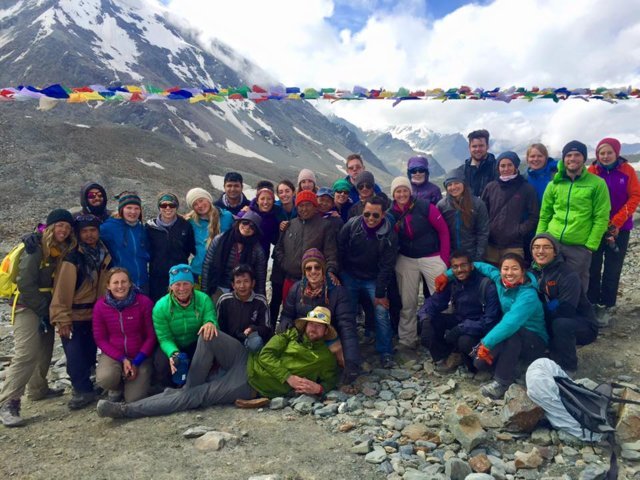
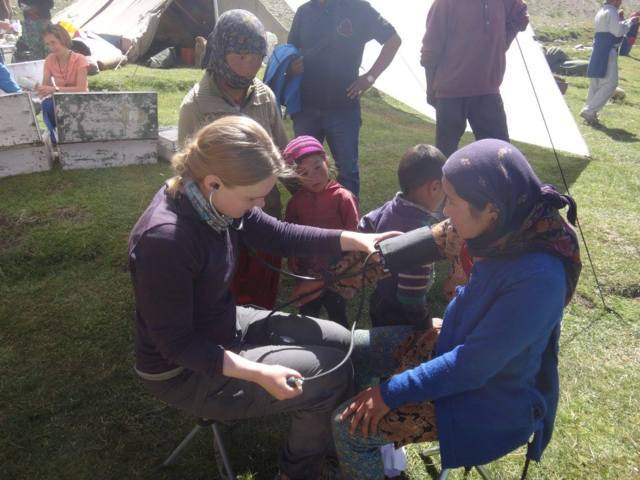
Last year was not only work related though. I moved back to Birmingham, where I grew up, and I was grateful to have the opportunity to rediscover my home city as an adult. There’s lots going on in Birmingham! I was also invited back to my school to give talks about studying medicine as a graduate, which most people don’t realise is a positive choice. As a keen sportswoman, I continued my triathlon training and participated in the Birmingham half marathon and the City of Birmingham triathlon last year, which I have no doubt I will do again this year too. I also joined the Wilderness Medicine weekend away in Snowdon to learn some expedition medicine skills and climb mount Snowdon. It was a great opportunity to meet medics from other years and combine my interests in medicine with my love of mountains.
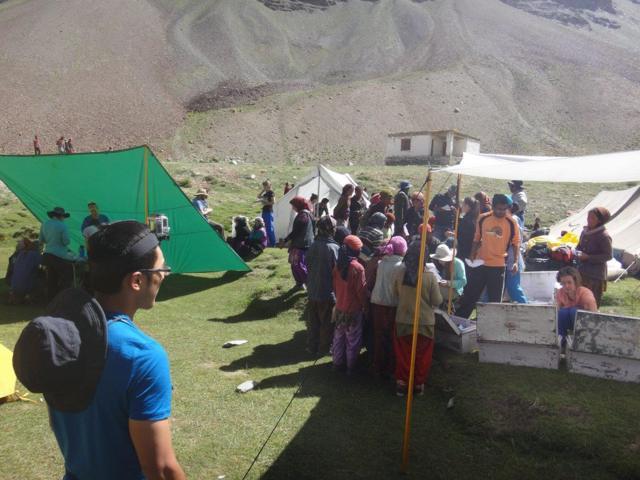
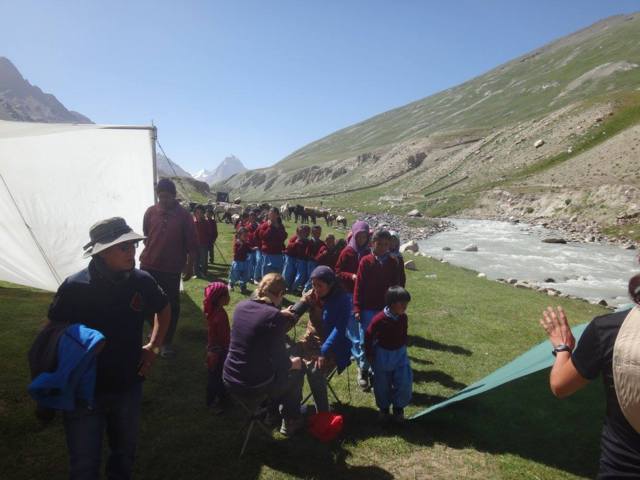
One of the most significant things that I used the grant money for was a medical expedition this summer to the Himalayan Ladakh region of India. I have trekked in this region twice with my family, and I was always shocked by its remoteness – the whole region is above the Himalayan tree line (3000m above sea level), and local inhabitants have to trek 3 weeks to get to the nearest doctor. Even then they are cut off for 7 months of the year due to heavy snowfall. When I was accepted into Birmingham medical school I began researching ways that I could be involved in delivering healthcare to this area and I was delighted to come across Himalayan Health Exchange – an American/Indian based company which enables doctors and medical students to undertake a medical expedition here every year. This August I joined a group of 29 doctors and medical students from around the world on a challenging trek and an incredibly rewarding experience. Over the course of three and a half weeks we saw over 600 patients, trekked over 120 miles, ascended up to 5600m above sea level, and made lifelong friends. We learned from each other during evening presentations, we were able to take on our own patients and come up with a management plan, distribute medications from our mobile pharmacy, and also experienced first-hand the medical challenged of being at high altitude. I have attached some pictures below which I hope speak louder than words.
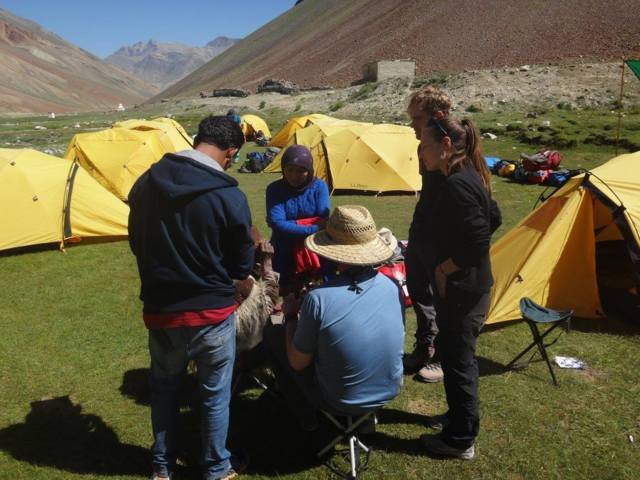
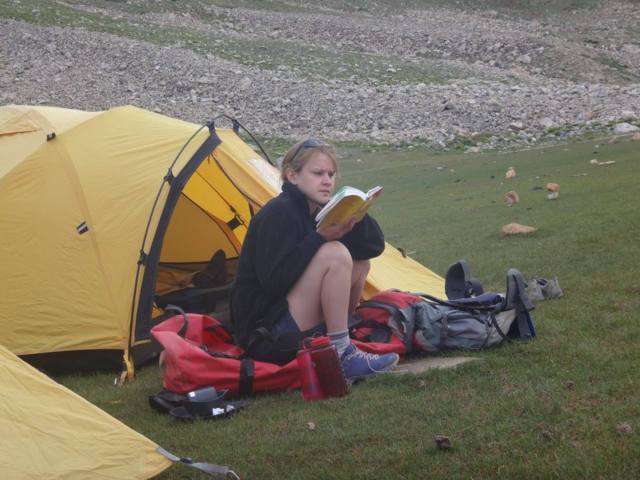
Claire Wallace
I would like to thank everyone at the Kidderminster Medical Society for the generous bursary I received at the start of my studies on the Graduate Entry Programme at St George’s, University of London.
I had a fantastic, very challenging year, and sometimes still can’t believe I’m here and training to be a doctor. It’s a pleasure to let you know how I’ve been getting on.
At St George’s, like other graduate courses, we race through years one and two and, afterwards, join those going into third year. What I think is great about training here is they get patients to come in and send you on GP attachments from week 1. We were able to apply our growing knowledge to real people. I loved meeting patients and putting what we were learning into practice.
We started with Life Cycle, looking at everything from reproduction to palliative care. I found the module really interesting, and started to see how I learned. Throughout the year we had weekly anatomy sessions in the Dissecting Room. They seem to be a bit love-them-or-hate-them, but I find them really useful. Peer tutors and core trainee surgeons teach us, and there’s little better than passionate people passing on their knowledge. It also means that from third year onwards, we can apply to gain teaching experience ourselves.
As a graduate I really appreciated the PBL structure and focus on self-directed study; reporting back what you’d learned twice a week to a small group.
Revising for the first set of exams before Christmas started during the second module, Life Protection. This was immunology, genetics, and cancer…the sensation of doing a marathon at sprint pace set in, and I felt keenly aware of being an arts graduate and had moments of ‘imposter syndrome’. These exams were going to show that I had no right to be here. Admissions had surely made a mistake. Luckily, I have been made some fantastic friends on the course, and through group study sessions, often late into the night, began to see that everyone felt that way, for whatever reason. Everyone finds different parts of the course hard. I’d heard people say that medicine is a team sport, and it really started to become apparent. You just have to work through it, but often it’s best to do it with others.
With the first set of exams over and done with, the new year got under way. I gained a place on St George’s University Challenge team! I can’t say too much as this series is still running… but we made it through to the television rounds and filmed in Manchester at the beginning of 2015. It was such a fun experience. St George’s is a small university, and it focuses on healthcare, so we were really pleased to have the chance to represent the other students and demonstrate a few other fields of interest!
We rushed back from filming to our second lot of exams, and after a short Easter break, headed into the final term; the final exams and our OSCE. My grandfather, to whom I was very close, became very ill and passed away. I went home when I could and when back in London I found it hard to concentrate. My personal tutor gave me advice and my friends helped me catch up things I’d missed, though it was only really after the funeral that was I really able to see how supported I had actually felt.
It helped to keep busy, and I distracted myself with work. Also around this time I and three other students co-founded the St George’s Athena SWAN Students Network; a Women’s Careers network. Our aim is to encourage women to believe in and push themselves, to excel, and to introduce them to role models so they can set their sights high. We have our first event this November. I’m really excited to see where we can take the society and how we can help other students at St George’s.
By the end of the academic year, we knew we were running on fumes, but the routines and camaraderie that we had developed really helped. Before medical school, I was an actress. Everyone said I would be confident when the OSCEs came round. I couldn’t believe how much more worried I was than before any audition I’d ever had! I could see how much it all meant to me and how much I wanted to do well.
I finished the year in the top decile and with a Merit in Medical Sciences. At the beginning of the year I would have been happy to just pass, so I was absolutely delighted. It really felt like all the hard work had paid off. After a challenging year it was great to relax, go on holiday, and finally see the family and friends who’ve been so supportive for the last year.
I’ve now started back at school as a third year! I really looked forward to studying again, and after a brief introductory module, started a 5-week placement at a GP practice. It’s been great to see just how much we’ve learned in a year. I felt like I was kept on my toes; any patient could walk through the door, I could need any one of the clinical skills we learned last year. Working daily with real patients has made me really look forward to my upcoming medical and surgery placements.
Studying in London brings with it the added issues of much higher rents and living costs. The peace of mind that has come with knowing I would be able to afford the first year’s tuition fees and be able to put extra money towards my rent every month for a while has certainly made things easier.
I can’t thank the Kidderminster Medical Society enough for the bursary. I was speechless when I was awarded it I really appreciate how much I’ve been able to since then.
Lucy Studd